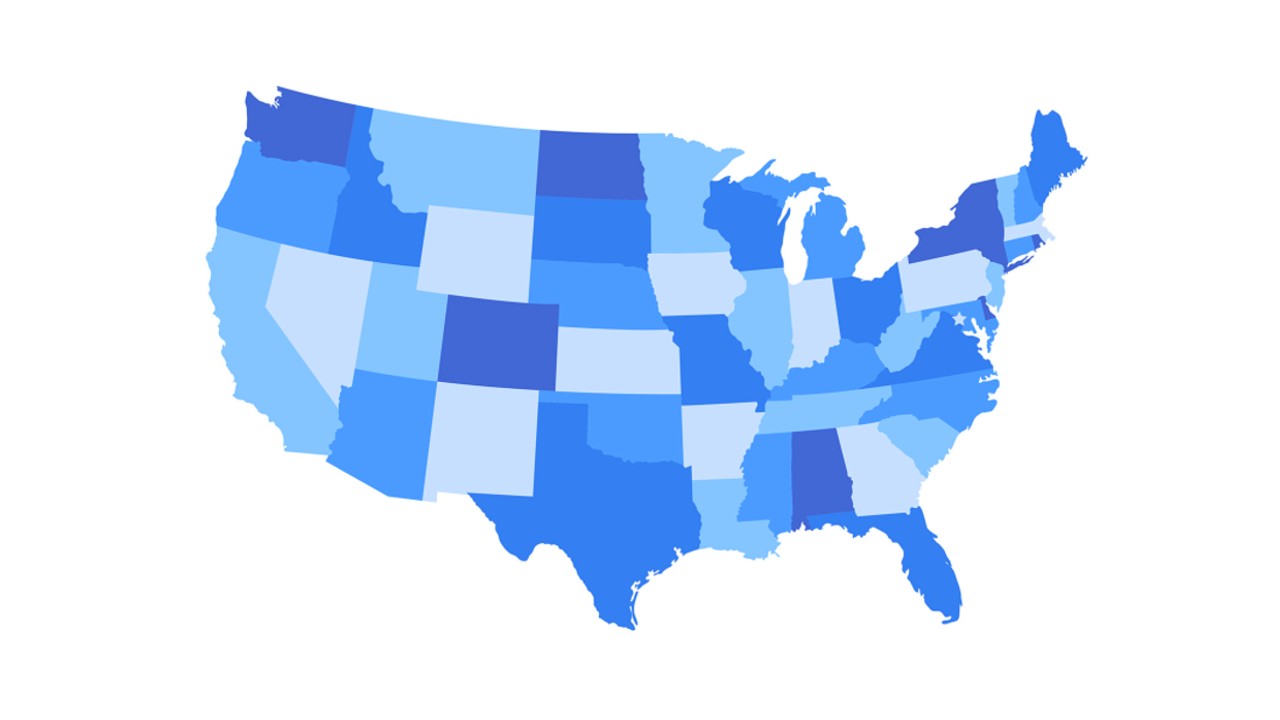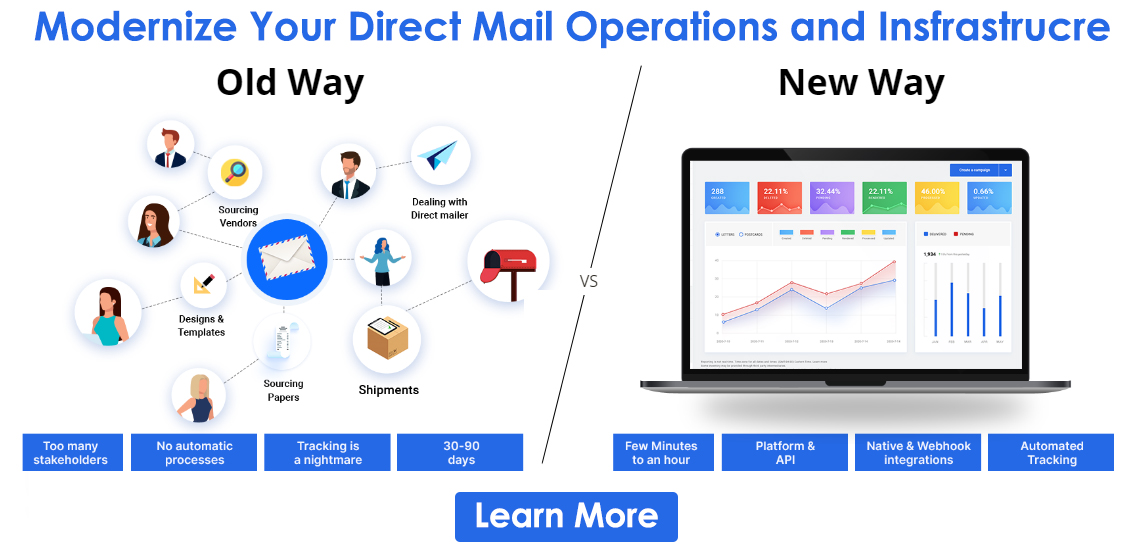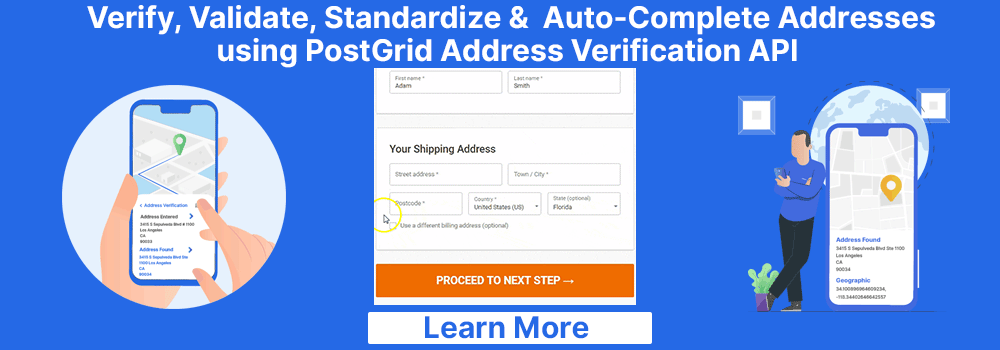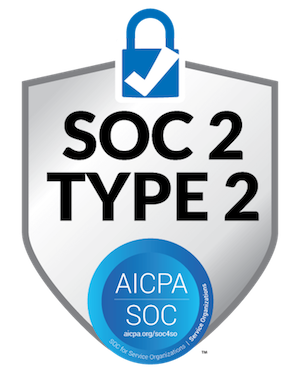
AVS Mismatch: Causes, Consequences of Ignoring it and Tips to Prevent it
When you are operating a business, it is essential to ensure that you have accurate customer information, especially their address. This helps in fraud prevention, ensures timely delivery of products and services, and boosts the impact of targeted marketing strategies. To confirm that you have the right address, you should incorporate an address verification system like PostGrid. It will check whether the provided address matches the official record, and if it does not, it will flag a mismatch.
In this blog, we will take you through the guide to AVS mismatch. We will talk about what does AVS mismatch means, its causes, and the repercussions of overlooking it. We will also discuss some tips to fix an AVS mismatch error using the right AVS tool.

Key Takeaways
- When an address does not match the details saved in authoritative databases like USPS, an AVS can’t verify the address. It will then return an AVS mismatch.
- AVS mismatch could arise from many reasons, such as human errors, outdated addresses, ZIP code mismatch, or a non-standardized address format.
- Ignoring AVS mismatch can make your businesses vulnerable to fraud, and chargebacks, and cause failed deliveries.
- Not resolving address-mismatch issues can also lead to ineffective marketing strategies, compliance issues, and ineffective operations.
- To prevent AVS mismatch, make sure you invest in an all-encompassing AVS like PostGrid. It offers standardization, autocomplete, fuzzy logic address matching, and rooftop geocoding.
What is AVS Mismatch Error?
When the address components provided by the customer do not match the address in the official database, it may result in an AVS mismatch. Almost every business relies on customer’s addresses to provide products and services, be it an ecommerce platform or a financial institution. They use an address verification system like PostGrid to ensure they have the correct address. It checks the accuracy and validity of the address against the address saved in an authoritative database like USPS. The system checks various address elements like the street name and number, city, state, postal code, etc. Some solutions might also generate AVS codes indicating the level of address matching.
Causes of AVS Mismatch
Multiple Ways of Writing an Address
Different people write addresses differently. It could be due to regional conventions, personal habits, or cultural preferences. In multilingual regions, an individual might prefer to write addresses in their native language or a mix of languages. This can lead to variations in how the address is presented. Since the official database in the US uses English, it might not understand it and flag it as a mismatch.
An emphasis on clarity and brevity can also lead to different types of addresses. When trying to write a concise address, some individuals might omit necessary address information.
Take, for instance, a person might write 123 Main St, 4B, Springfield, IL, 62704, but the official database has the following address: 123 Main Street, Apartment 4B, Springfield, Illinois 62704, USA. In this case, it will not be an AVS match.
Your customers can also use alternative street addresses and spellings, leading to an AVS mismatch. Take, for example, the billing address provided by the customer as 1st Ave SE, however, the official record has First Avenue, Southeast. The AVS might not recognize the two as equivalent and would flag the user input as a mismatch.
Typographical Error
Also referred to as a typo, these mistakes happen during the typing. The customer might write the wrong spelling, misplace a punctuation, or transpose a number. The typo might alter the key component, such as the street name or building number. The system might fail to identify the record and return an AVS mismatch.
For instance, if a customer enters 1234 Elm Street, instead of 1234 Elm Street, the AVS will not be able to find a match and classify it as a non-match.
Outdated Address
Any address that is no longer current or valid is outdated. It could be due to relocation or the name of the property changed. AVS like PostGrid cross-references addresses provided by the customer with the NCOA database to ensure it is recent. When your customers change their address, but do not register it with the official address database, it can lead to an AVS mismatch and declined transactions.
ZIP Code Issues
ZIP codes are a key component of address verification. By pinpointing the geographical information, they help the AVS know that the address is valid. When a customer enters a wrong ZIP code, the system will not be able to find a match in the database and return an AVS mismatch.
Moreover, ZIP codes change over time. Several reasons, like population growth, or changes in geographical outline, can compel the USPS to change the ZIP codes. If a customer enters an outdated ZIP code, the system will flag the mismatch between the address. Additionally, if the ZIP code is entered in the wrong format, such as incorrect spacing or a missing digit, the AVS will fail to verify it.
Non-Standardized Address Format
There are different ways to format an address. Some postal services accept abbreviations while others prefer complete words. This can make it difficult for the AVS to verify the address. Additionally, there is no global address standard format. Each country has its standards.
For example, in the US, the address is written in a single line separated by commas. However, in the UK, each element of the address is written in a different line.
Take, for instance, an address in US 679 Main St., Apt 7, Las Vegas, Nevada, 88901. But in the UK, an address will be written as the following
| Mr John Smith
Flat 22B 123 High Street London SWRP 1AA U.K. |
When you use an AVS system designed to only handle domestic addresses, it won’t be able to verify international addresses and result in an AVS mismatch.
Secondary Addresses
This can be a temporary housing address. Customers might use temporary addresses when they are staying in a house for a short term. This billing information will not be updated on the official database. When an AVS will cross-check this address against the USPS records, it will flag it as a mismatch, and the transaction will be declined.
Consequences of Overlooking Address Verification Service Mismatch
Failed Deliveries
If the billing address does not match the shipping address and you choose to overlook it, you might end up sending deliveries to the wrong person. Your product will either get lost or it will get returned. In both cases, your operational cost will increase. Losing the product will result in losing money.
Additionally, when you have to return the product, you will have to fix the address and reship the product. Shipping carriers like FedEx and UPS charge around $18 to $20 as an address correction fee. This will increase your shipping expenses.
Fraud
If there’s an AVS mismatch, it could mean a potential fraud. A fraudster can commit credit card fraud by using a stolen credit card to purchase something on an ecommerce site. They will provide their address in the shipping address, but they won’t have access to the correct billing address.
The AVS compares the billing address provided during checkout and detects the mismatch. It will flag the discrepancy. You should immediately check the billing address entered with the card network or the bank. By overlooking this warning, you might unknowingly authorize a fraudulent transaction. You will ship the goods and services, and never receive a legitimate payment.
Moreover, when the cardholder finds out about the payment, they will contest the transaction with the card company because they didn’t authorize it. This will lead to a chargeback fee.
Additionally, repeated cases of address-associated fraudulent activities will project your business as incapable of implementing strong security measures to protect payment information. If you keep sending packages to the details that do not match the address on file, the customers will lose trust in your brand, resulting in damage to the reputation.
Chargebacks
If you send the products or services to an address that was flagged as an AVS mismatch, you might be subjected to a chargeback fee. When customers feel the goods and services were not what they were expecting or they did not make the purchase, they may contest the card transaction with the card issuing bank. You will have to refund the amount due to the AVS mismatch overlooking.
If you continue to bypass AVS mismatch and operate your business, your chargeback rates will exponentially increase. The high volume might lead to the payment processor blocking your merchant account. This will make it challenging for you to accept payments in the future. Moreover, when customers learn about the consistent cases of misdeliveries, it will erode their trust and they will avoid shopping from you.
Loss of Marketing Opportunities
Effective marketing significantly relies on the location. One of the risks of AVS mismatches is ineffective marketing. If you receive an AVS mismatch and you ignore it, it can have a significant impact on your ability to effectively reach the target audience, leading to missed marketing opportunities.
If you do not cross-check the billing address provided by the payer, you will have incorrect or outdated information in the database. You will segment the customers of these wrong addresses and create a targeted marketing campaign. When the promotions are sent to the wrong or non-existent addresses, it will yield no result.
Moreover, without accurate addresses, you will lose out on the opportunity to create brand awareness among potential customers. Additionally, if your business relies on direct mail marketing campaigns, inaccurate or outdated addresses might decrease the response rate and waste the marketing budget.
Overlooking an address that does not pass an AVS check will also skew your market research data. Your source of insights will be incorrect. Hence, your conclusion about the demographics, preferences, and behavior will be inaccurate. This will hinder strategic decision-making and market planning.
Frustrates Customers
If you overlook an AVS mismatch, you might ship the product to the wrong or outdated address. The right customer will be left waiting for the product. This negative shopping experience will frustrate the customers.
Multiple instances of misdeliveries in case the AVS doesn’t match the address provided by a customer will make them wary of your business. They will avoid shopping for your business. Moreover, frustrated customers are likely to leave a negative review. This can prevent you from acquiring new customers.
Operational Inefficiency
When you overlook AVS mismatch, you make your team do more work. They will have to invest time and resources in multiple tasks like reshipping the products, handling returns, and resolving billing issues. These resources could have been used for other productive activities. As you continue conducting operations without resolving AVS mismatch, your inefficiencies will add up and decrease the overall productivity.
Legal and Compliance Issues
In industries like banking, finance, and eCommerce, address verification plays a crucial role in verifying identity and preventing fraud. Verifying an address is also a part of the Know Your Customer and Anti-Money Laundering laws. Failing to comply with these regulations will result in financial penalties. Furthermore, these violations might impact your relationship with financial institutions and payment processors.
If you repeatedly overlook AVS mismatch, the AML, you could be flagged for an AML violation. When a regulatory body identifies that a business has been consistently ignoring AVS mismatches, it might conduct an audit.
Additionally, it might impact your ability to do business. Certain businesses, especially those in financial service, need a license or certificate to operate. Address verification is a crucial element of these licenses. Conducting business while consistently overlooking address verification mismatches can result in a loss of your operating license.
Why do Legitimate Charges Get AVS Rejected?
There could be multiple reasons why legitimate transactions get rejected by the AVS. Maybe your customers have entered incorrect information, the format is different or they have provided outdated information. It is important to keep in mind that not every AVS mismatch may indicate fraudulent activity. This is why it is best to encourage your customers to be careful when they enter the address.
How to Prevent Address Verification System Mismatches?
Standardize Address Format
It involves breaking down the various address elements and then structuring them in the standard format as per the postal standards laid down by USPS. One of the cons of AVS available in the market is they do not standardize the address.
However, PostGrid automates the standardization process by checking abbreviations, correcting misspellings, and arranging in the proper format. We identify the discrepancy between the billing address and the address in the national database. We standardize, make corrections, and enrich addresses with premise-level details like ZIP+4 codes, and delivery point validation codes at the point of entry. We ensure that no AVS mismatch occurs.
We are CASS certified and hence have access to the USPS database to ensure your domestic addresses are in the correct format. Furthermore, we can standardize addresses for more than 245 countries as per the relevant country’s format. We ensure that you have a clean database of accurate, well-formatted, and complete addresses.
Ask Your Customers to Send a Request for Change of Address to NCOA
As mentioned above, outdated addresses can lead to an AVS mismatch. PostGrid’s AVS cross-references the address with NCOA to verify any change of address. National Change of Address is a database that has a record of all the change of address requests made by individuals, businesses, and families. As per the NCOA database, we periodically update addresses in your system. This ensures that you have up-to-date addresses of the customers. To prevent AVS mismatch due to outdated addresses, encourage your customers to send a request to NCOA to update their billing address.
Integrate Real-Time Autocomplete Feature in Your AVS
Prevent AVS mismatch and speed up the checkout process by using an address verification system that has an in-built autocomplete feature like PostGrid. As soon as the customers start entering the address, our autocomplete API provides type-ahead suggestions. This ensures that customers enter the correct address and no mismatch can occur. Within a few keystrokes, customers can fill in all the necessary address details. This ensures accuracy and prevents customers from having to deal with the cognitive load of recalling the address every time they shop from you. When customers won’t have to fill in every field, it will enhance the experience and improve the chances of conversion.
It is important to note that AVS in the market typically provides suggestions for the building name. The lack of additional address components like apartment or floor number can confuse the delivery agent and lead to misdeliveries. However, PostGrid’s autocomplete API provides premise-level address data. Your customers can select their apartment, suite, and floor number. This will ensure the mail reaches the intended recipient.
Another problem with many autocomplete tools is that they provide address suggestions from the entire world. Your customer might be sitting in Michigan, and because certain elements of the address are the same as some addresses in Illinois, the tool will also display those address suggestions. This can confuse and frustrate your customers. PostGrid’s autocomplete API comes with geolocation capabilities. Our suggestions are based on your customer’s IP address. This prevents customers from searching through hundreds of irrelevant address suggestions, saves time, and enhances customer experience.
Leverage Fuzzy Logic Address Matching
It is an artificial and machine learning technology that determines address accuracy by identifying similar but not 100% identical elements. It can accommodate minor variations, typos, and formatting differences in the address. Customers often use abbreviations while entering the address. Take, for instance, they may write Main St. instead of Main Street. Fuzzy logic address matching allows such slight variations, and instead of returning the result as an AVS mismatch, it will prompt for further verification.
With the PostGrid address verification system, you can identify misspellings, abbreviations, incorrect spacing, or missing address elements and fix them at the point of entry. This ensures that your address database is accurate and complete.
Use Rooftop Geocoding
Geocoding is the technique of converting physical addresses to latitude and longitude. Since it provides coordinates, any misspelling, address variations, or formatting differences can be accommodated, preventing AVS mismatch. Aside from basic geocoding, like forward and reverse, PostGrid offers rooftop geocoding. By pinpointing the address of the building’s rooftop, it adds a layer of precision to the verification process.
A general AVS process offers traditional geocoding, which only locates addresses at the neighborhood or postal code level. If the address is incomplete or the formatting is different, AVS will return a mismatch. By incorporating rooftop geocoding, PostGrid ensures that even with slight variation and formatting issues, the address corresponds to the intended building. This will not trigger an AVS mismatch.
Furthermore, PostGrid geocoding works in conjunction with fuzzy logic address matching. Even if there is a slight variation, like abbreviations or spelling errors, the system will be able to verify it by cross-referencing with the real-world geographic data.
Conclusion
An AVS mismatch occurs when the address provided during shopping fails to match the details in a legitimate database like USPS. Preventing AVS mismatch is crucial to maintaining efficient operation, enhancing customer satisfaction, and preventing fraud and compliance-related issues.
Comprehensive tools like AVS provided by PostGrid come with advanced features like address standardization, autocomplete API, fuzzy logic address matching, and more to prevent the possibility of AVS mismatch.
Our entry-point and real-time verification, standardization, and autocomplete will ensure a full AVS match. By investing in our AVS tool, you can maintain a database of correct and complete addresses. This will prevent failed deliveries, and reduce operational costs, frauds, and chargebacks.
Moreover resolving address issues at the point of entry with PostGris’s feature-rich AVS will ensure that you are compliant with regulatory requirements. It will also help you create impactful targeted marketing strategies, thus increasing the possibility of desirable outcomes. Want to know how we can prevent AVS mismatch? Request a demo now.
Frequently Asked Questions
What is the Full Form of AVS?
AVS stands for Address Verification System. It checks whether or not the address provided by the customer while doing the transaction is the same as the one saved in the national address database.
What is the Benefit of Using AVS?
AVS is one of the powerful deterrents to prevent credit card fraud and other address-related malicious activities, as it helps verify the billing address with the card. Other than this, it helps save money, create impactful targeted marketing strategies, and boost customer satisfaction by ensuring accurate billing addresses with their card. An AVS can either be a platform, an API, or both like PostGrid.
What is a Positive AVS Response?
When the address entered by the customer matches the records in the respective country’s postal database, the AVS system returns a positive response that the address is verified.
What Does AVS Rejected Mean?
This means that the AVS system cannot verify the customer’s address. The system generates AVS mismatch codes which indicate that the address provided by the customer at the time of checkout is different from what is registered in the USPS database.
What Should I do if I Get an AVS Mismatch but Address is Correct?
You can request your customers to provide proof of identity that will ascertain that they live in the location they are claiming to, which is essential for effective card verification. In case they are using a credit card, you can cross-check the address with their card issuer. You should also ask the customer to change their address in the national address database such as USPS. This will ensure that the AVS doesn’t show a mismatch the next time they make a purchase.
Does the International Address Impact Address Verification System Matching?
Yes, if an address verification system does not support international address verification, it can return an AVS mismatch. There is also a possibility that the country for which you are verifying the address does not support AVS that you are using. We recommend investing in PostGrid which offers global address verification for more than 245 countries.










